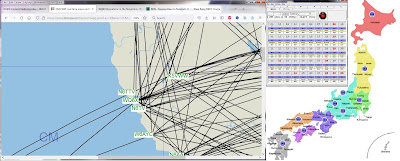APP called the JIDX Tracker, offering a spreadsheet-like view of WHICH prefectures were worked
and on what bands. This APP was adapted to track IARU Zones during the annual IARU contest,
as well as California counties in the state QSO party - CQP. It could also be adapted to track CQ Zones, States/Provinces and ARRL sections (for Sweepstakes and FD events).
Another useful source of data for shaping our understanding of what propagation was like during a given time frame is the RBN (Reverse Beacon Network). During radiosport events, I tailor CQ calls
on Cw and RTTY to insure the RBN systems include WQ6X amongst their system data. Checking that data during the contest helps me determine where to position a yagi (or yagi-stack if I am using one), theoretically maximizing my listenership, just like a broadcast station does.
Just the opposite also occurs - stations will call
in from one or more areas and yet, no RBN activity is reported in those areas.
Actual propagation (versus theoretical propagation) is often very WEIRD.
Remember this: In the days of increasing SFI, sudden and massive solar storms can disrupt our geomagnetic ionosphere w/o notice.
Then, for the next few hours, we transmit into a dramatically changed ionospheric refraction system. It is this variable that often "levels the playing field"; sometimes locations which seem better geographically can actually end up overall "getting the worst of it", when it comes to Space-WX.
This was actually quite evident during the 2022 ARRL 160-meter contest. Stations on the East
coast and in the New England who usually experience a "pipeline" to Europe, came up short.
Likewise, stations on the West coast who are used to an Asian pipeline were also disappointed.
The disastrous effects of horrible space-WX don't discriminate - it's all just an atmospheric thing.
ago as a point of comparison to predict this year's likely performance. Then again, these are just predictions - space-WX, operator participation and equipment performance can all have a dramatic impact on how our individual performance will actually turn out.
It is for ALL these reasons that I view radiosport contesting as training exercises for emergency preparedness. Some of the BEST ways to learn about the REAL world, is to experience it all at
the level of a game - which ultimately is what radiosport contesting is about.
Do YOU ever review old logs and Blogs before a radio contest event?
What things have YOU learned?



No comments:
Post a Comment